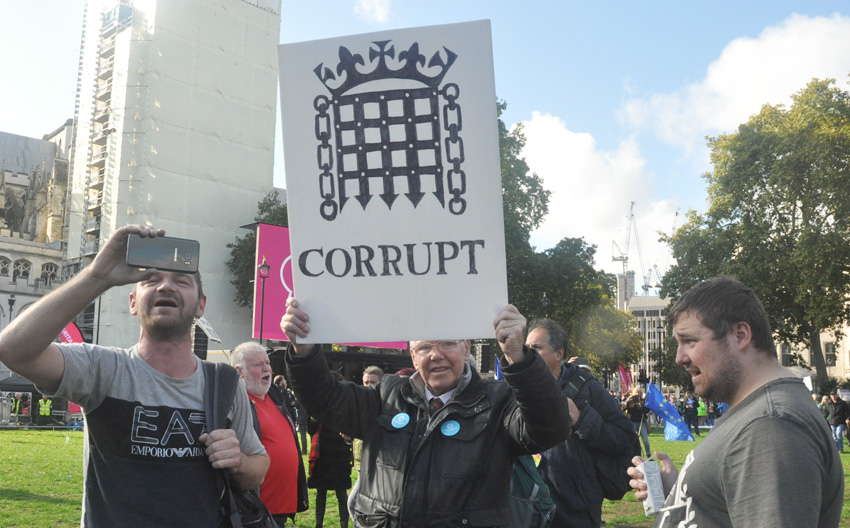AS EXPECTED, the Speaker of the House John Bercow yesterday blocked Parliament from voting on the new Brexit deal with the EU.
Announcing his judgement the Speaker said: ‘It is clear that the motions are in substance the same, however this matter was decided fewer than 49 hours ago, after more than three hours of debate the House voted by 322 to 306 for Sir Oliver Letwin’s amendment which stated and I quote: “this House has considered the matter, but withholds approval unless and until implementing legislation is passed” unquote.
‘The second matter for me to consider was whether there had been any change of circumstances that would justify asking the House to reconsider on Monday what it had decided on Saturday. On the face of it, unless an event or development external to the House had interceded, it is hard to see a significant change of circumstances that would warrant a reconsideration on the next sitting day.’ He added that there was no significant change in circumstances that warranted another vote.
There was outrage from MPs who, one after another, raised points of order challenging the Speaker’s impartiality, accusing him of ruling on behalf of the Remainers.
Tory MP for Wellingborough Peter Bone said: ‘When we were debating on Saturday nobody knew whether the Prime Minister was going to send a letter or not. Since that has happened, whilst you are quite correct to say that the motion is the same, an event outside has dramatically changed it.’
Tory MP William Cash, representing Stone in Staffordshire, made a point of order: ‘The law of the land, set out in section 1 of the Withdrawal Act 2018 quite unequivocally states that the European Communities Act is repealed on exit day which is 31st October. The Benn Act has not done anything yet other than in respect to the letter to change the repeal of the 1972 Act … The law of the land remains that we leave on October 31st.’
Bernard Jenkins. Chair of the Public Admin & Constitutional Affairs Committee, made his point of order: ‘It is becoming remarkable how often you please one lot and not the other lot.
‘… It has also been one of your mantras Mr Speaker, that the House should be permitted to express its view, even when it comes to changing the meaning of standing orders. And yet you have denied the opportunity of the House to express its view on this matter. This motion was never voted on on Saturday. No, No. This motion was never voted on, it ceased to exist as soon as it was amended.
‘… Can I just alert you and the House Mr Speaker that my committee will be holding a hearing on the role of the Speaker, and it has to be said, somewhat in the light of events of recent months.’
Bercow replied: ‘I say to the honourable gentleman that I hear what he says about his committee conducting an inquiry into the role of the speaker and that is absolutely proper, and I think he said something from a sedentary position about tomorrow, and evidence being taken and witnesses being heard and that is absolutely right, I don’t know what he expects me to deduce from that … The judgement I have made is about the importance of upholding a longstanding and overwhelming convention of this House, that is what I have done, and I make absolutely no apology for it whatsoever.’
Crispin Blunt, Tory MP for Reigate, then said: ‘I am one of the members who has formally recorded my anxiety about your impartiality in the chair and the right way to do that is formally.’
Labour leader Jeremy Corbyn said: ‘Despite his pledge the Prime Minister is not to be found anywhere in a ditch. Despite having told the British public that he would never do it, he has put in a request for an extension. This allows us the space to scrutinise.’
Tory MP William Cash intervened: ‘The urgent question was introduced by the leader of the opposition. Can I refer the right honourable friend to a bill that was introduced in 1997 in the name of the leader of the opposition with the right honourable Tony Benn, which says that Sections two and three of the European Community Act 1972 are hereby repealed, that the European Court of Justice shall have no effect in the United Kingdom, and would he also recall the number of times which, as far as I am concerned, was indefinite, when the right honourable leader of the opposition was in the lobby with me on every single occasion relating to European matters. Does he accept, that really does demonstrate a monumental U-turn and lack of memory and a lack of understanding of what the Withdrawal Bill is all about and the referendum itself.’
